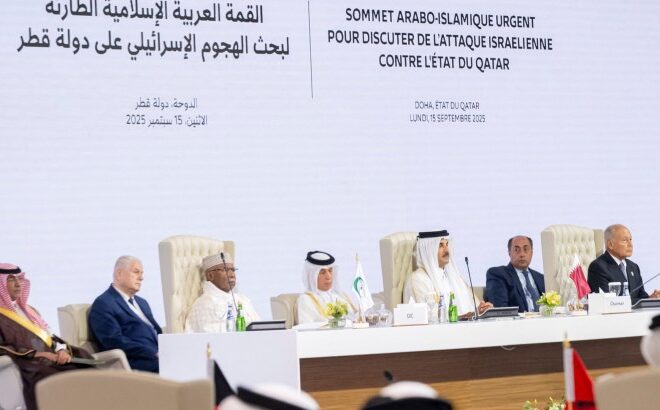Rubio downplays U.S. tensions with Israel, plans to visit Qatar after strike

Rubio Downplays U.S. Tensions with Israel Following Airstrike
In a recent diplomatic visit to Jerusalem, U.S. Secretary of State Marco Rubio sought to ease concerns regarding rising tensions between the United States and Israel. His remarks came after a significant airstrike by the Israeli military, which targeted Hamas negotiators in Qatar. This operation not only caused outrage across much of the Arab Middle East but also disrupted ongoing discussions aimed at resolving the Gaza conflict.
Meeting with Prime Minister Netanyahu
On Monday, Rubio met with Israeli Prime Minister Benjamin Netanyahu, where the two leaders discussed the current geopolitical climate and the implications of the airstrike. The strike, which took place nearly a week prior, has drawn widespread condemnation from various Arab nations and has raised questions about the U.S.’s stance in the region.
Despite the backlash, Rubio emphasized the strong bond between the U.S. and Israel, stating that the relationship remains robust. He acknowledged the complexities of the situation but insisted that the U.S. continues to support Israel’s right to defend itself against threats, particularly from Hamas, which the U.S. designates as a terrorist organization.
Context of the Airstrike
The airstrike in question was aimed at Hamas officials who were reportedly engaged in negotiations in Qatar. This action has been described as a significant escalation in the ongoing conflict, leading to increased tensions not only between Israel and Hamas but also among regional allies and adversaries. The operation was met with swift condemnation from various Arab leaders, who viewed it as a violation of diplomatic protocols and an impediment to peace efforts.
In the wake of the airstrike, President Donald Trump distanced the United States from the operation, reflecting concerns about the potential fallout on U.S. relations with Arab nations. The President’s comments indicated an awareness of the delicate balance the U.S. must maintain in the region, especially given the historical complexities of U.S.-Middle East relations.
Rubio’s Upcoming Visit to Qatar
Following his discussions in Jerusalem, Secretary Rubio announced plans to visit Qatar. This trip is anticipated to focus on diplomatic efforts aimed at stabilizing the region and addressing the fallout from the airstrike. The visit underscores the U.S. commitment to engaging with key players in the Middle East, particularly those involved in the ongoing Gaza conflict.
Rubio’s upcoming meetings in Qatar are expected to include discussions with Qatari officials about their role in facilitating negotiations between Hamas and Israel. Qatar has historically served as a mediator in the conflict, and its involvement is seen as crucial in efforts to reach a ceasefire and ultimately a long-term resolution.
The Broader Implications for U.S. Foreign Policy
The tensions arising from the recent airstrike highlight the challenges faced by U.S. foreign policy in the Middle East. The U.S. has long been a supporter of Israel, yet it also recognizes the importance of maintaining relationships with Arab nations. The delicate balance of these relationships is crucial as the U.S. navigates its role in promoting peace and stability in the region.
Rubio’s comments reflect an understanding of these complexities. While he reaffirmed U.S. support for Israel, he also acknowledged the need for dialogue and cooperation with other nations involved in the conflict. The U.S. aims to foster an environment conducive to peace, which may require navigating the fallout from unilateral actions such as the recent airstrike.
Conclusion
As Secretary of State Marco Rubio continues his diplomatic efforts in the Middle East, the situation remains fluid. The airstrike targeting Hamas negotiators in Qatar has not only heightened tensions but also prompted a reevaluation of U.S. foreign policy in the region. Rubio’s meetings with Israeli and Qatari leaders will be pivotal in shaping the U.S. approach moving forward.
The coming days will reveal how the U.S. seeks to balance its support for Israel with the need to engage constructively with Arab nations, as the search for a resolution to the Gaza conflict continues.
Key Facts
– Secretary of State Marco Rubio met with Israeli Prime Minister Benjamin Netanyahu in Jerusalem.
– The meeting followed an Israeli airstrike on Hamas negotiators in Qatar, which sparked outrage in the Arab Middle East.
– President Donald Trump distanced the U.S. from the airstrike, reflecting concerns about its impact on regional relations.
– Rubio plans to visit Qatar to discuss diplomatic efforts related to the Gaza conflict.
– The U.S. aims to maintain a balance between supporting Israel and engaging with Arab nations in the pursuit of peace.
Source: www.washingtonpost.com


